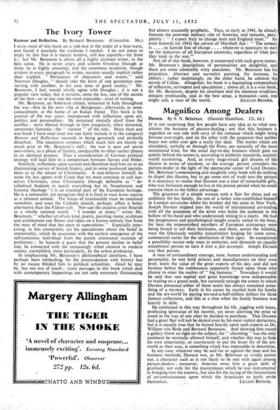Magnifico Among Dealers
IT is not surprising that few people have any idea as to what con- stitutes the business of picture-dealing ; nor that this, business is regarded on one side with envy of the romance which might bring fortune over-night, and on the other with the suspicion that neither buyer nor seller ever gets a teally fair deal. The stories which are circulated, verbally or through, the Press, are naturally of the most sensational kind, for the usual day-to-day business which goes on quietly behind the scenes is, according to publicity standards, scarcely worth recounting. And, as every stage-struck girl dreams of the theatre in terms of stardom, so the average person considers the picture-dealer in the light of the spectacular career of Lord Duveen. Mr. Behrman's entertaining and naughtily witty Wok will do nothing to dispel this illusion, but to get some sort of truth into the picture it is necessary to realise that Duveen was a man of remarkable gifts, who was fortunate enough to live at the precise period when he could exercise them to the fullest advantage.
The grandson of a simple woman with a flair for china and an ambition for her family, the son of a father who established himself in London art-circles whilst his brother did the same in New York, Joseph Duveen stepped into the world of international art-trading with all the assurance of the artist who holds the audience in the hollow of his hand and who understands timing to a nicety. He had the imagination and psychological insight exactly suited to the hour, for here the impoverished members of European aristocracy were being forced to sell their heirlooms, and there, across the Atlantic, were the fabulously wealthy industrialists longing for some extra- commercial outlet for the satisfaction of their egos. So exceptional a possibility occurs only once in centuries, and demands an equally exceptional person to turn it into a fait accompli. Joseph Duveen was that person.
A man of extraordinary courage, taste, human understanding and personality, he met both princes and manufacturers on their own level, knew the value of the great exPerts of his day, and did not hesitate before the ruthlessness apparently forced upon those who choose to enter the realms of " big business." Nowadays it would be said that vast capital and great knowledge were indispensable to trading on a grand scale, but curiously enough the extent to which Duveen possessed either of these assets has always remained some- thing of a mystery. Early in his career he startled both his family and the art-world by paying ten-and-a-half-million dollars for three famous collections, and this at a time when the family business was heavily in debt.
He continued in this way throughout his life, juggling with loans, professing ignorance of his income, yet never allowing the price to stand in the way of any objet he decided to purchase. That Duveen had a great flair will not be denied even by his most violent detractors, but it is equally true that he leaned heavily upon such experts as Dr. William von Bode and Bernard Berenson, And showing him round a gallery threw no light on the subject, for" charming " was the only comment he normally allowed himself, and whether this was to hide his own uncertainty, or courteously to put the lesser fry of the art- world at their ease, is something which Ivas impossible to determine.
In any case, whatever- may be said for or against the man and his business methods, Duveen was, as Mr. Behrman so vividly points out, a character such as is not likely to be met with again among picture-dealers ; moreover, America owes him a great debt: of gratitude, not only for the masterpieces' which he was instrumental in bringing into the Country, but also for the laying of the foundations of art-consciousness upon which the Americans so justly pride







































 Previous page
Previous page